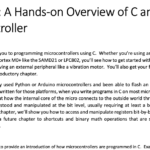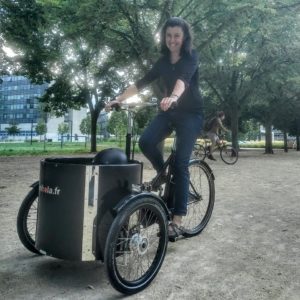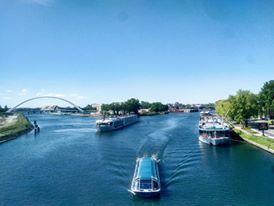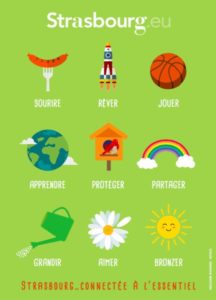Many professors in Canadian universities get a "sabbatical year" once every few years. My first sabbatical year was from July 2018 to June 2019 and I spent most of it in Strasbourg, France, with my wife and kids. Unlike what many people outside of academia think, it's not a vacation, but is generally considered a time to regroup and recharge. It's an opportunity to ask and answer questions about our research and / or teaching, removed from distractions (like meetings!).
We are required to propose a plan to our colleagues prior to embarking on the sabbatical and report back when we're done. One of my colleagues, Prof. Dawn Bazely, suggested that I make the typically private report public, instead. So, like her, I've decided to blog about it here.
As part of the formal reporting process we are required to answer some questions for the administration. I'll start with that and link to other, potentially more interesting and useful details about my sabbatical activities.
Admin question 1a: Please provide a report on your programme of activities for the period of sabbatical leave, highlighting any significant changes from your original plan and submit this report to the chair of your department.
Here is an outline of the originally planned items and how my sabbatical deviated from them.
- Teaching in Strasbourg, France (INSA). I revised existing curriculum for a lab course on microcontrollers at INSA Strasbourg, a polytechnic engineering school. I taught the microcontroller lab modules and helped conduct lab tests for the undergraduate mechatronics and electrical engineering students. I also created and taught three lab modules as part of a senior-level mechatronics design class.
- Teaching in Karlsruhe, Germany (HsKa). I created new curriculum for an embedded course and taught it as part of the International Program at the applied sciences school, Hochschule Karlsruhe (HsKa). The course was offered twice and is similar to aspects of York University's EECS 2032, EECS 3215 and EECS 3216 courses.
- Conducting research on 3D printing and biomedical devices. I was originally going to work on a continuation of my research into cervix models associated with human birth. Due to complications related to obtaining a work visa in time (we flew back to Canada in November to restart the process and had to wait until March for the City of Strasbourg's immigration office to clear my file) I was not able to work at the robotics lab at the local research hospital.
- Conducting a survey on engineering education. Originally, I was going to adapt a survey designed for engineering students by the Engineering Change Lab and Engineers Canada for the French and German contexts. In discussing the possibility with INSA and HsKa colleagues I determined that there was little enthusiasm from my European counterparts. So I did not pursue this.
Here is a description of unplanned activities that were undertaken:

- Writing a textbook. As it became apparent that working at the research hospital in Strasbourg was more and more unlikely I focused more on developing a textbook. The textbook is a unique take on the C programming language for engineers and computer scientists, with a focus on the embedded systems space. The uniqueness stems from the use of six different microcontroller platforms (4 in C, one in Python and one using the Arduino IDE) and with the mapping of material to accreditation bodies. My co-author and I have a tentative book deal with the University of Toronto Press.
- Guest talk at the Technical University of Munich
- First steps towards establishing exchanges with INSA and HsKa
- Language courses. I took two language courses while I was in Europe. First, I took a German course (level A2, courtesy of a DAAD scholarship). Second, I took a French language course (level B2).
- Re-obtained my amateur radio licence. Space Engineering students in the Lassonde School have the option of receiving their licence and it occurred to me that supporting this and possibly extending that possibility to electrical (and other) engineering students may be beneficial.
Admin Question 1b: If you would like to provide a a list of papers presented, creative exhibits or performances and publications submitted or accepted during this sabbatical leave, please click here.
- Chapter 1 of the textbook I began writing on the sabbatical will be submitted via the internal York report. (blog post)
- Updating and teaching curriculum in French engineering school (microcontrollers and mechatronics) blog posts.
- Blog post about teaching a new course in a German Engineering school.
- On taking language courses: French and German blog posts.
- Twitter postings (examples) on sabbatical activities (INSA-specific and HsKa-specific)
Admin question 2: If you would like to provide any additional information about your sabbatical leave, you may do so in the text box below.
One of the most important aspects of the sabbatical has nothing to do with the research or teaching: what about your family and what's the visa process like?
[update]
First, three take-aways from my spouse:
- Double-check the visa paperwork. It's not straight-forward, and the more eyes looking at it and verifying, the better.
- The sabbatical year is an opportunity for you, the spouse, too. Working overseas is a possibility (some universities can make internal arrangements for spouses) as is taking professional development classes locally or at a distance. Language classes and cultural classes in your sabbatical city are a great possibility, too.
- Ex-pat groups are available in many cities, sometimes tied to embassies or consulates. Strasbourg's Americans in Alsace group was one such example that liked including Canadians.
[\update]
In the lead up to the sabbatical my wife expressed a strong desire to spend a year abroad in a French-speaking country. I had supported a German colleague, Prof. Klemens Gintner, during his sabbatical in Toronto and he suggested that we consider Strasbourg, France. He connected me with his colleagues at the French engineering school, INSA Strasbourg.
As a family, we decided that living in France would be really interesting and possible. Strasbourg is arguably the heart of Europe, due to its history, geography and its political status. It sits on the west bank of the Rhine River, with pedestrian, transit and cycling bridges connecting Strasbourg to Kehl, Germany on the east bank. A streetcar connects the centre of Strasbourg to the centre of Kehl, making it convenient (and cheap!) for Strasbourg residents to do their groceries and shopping in Germany.
Primary and secondary schooling is free in France, including the International schools. One of our children attended French public school while the others attended an international school (Conseil des XV: "Council of the fifteen", in English), with classes in both French and English (but Polish, Spanish and German are options for those with backgrounds in those languages).
Rent in Strasbourg is similar in cost to Toronto. We lived in a 200 year old half timber apartment in the student district near INSA Strasbourg and the main university campus (INSA is separate but adjacent to the University of Strasbourg). Strasbourg offers a bike rental system (one year is about one hundred euros and you get to keep the bike at home) and we purchased a cargo bike in lieu of a car for the year.
Our real estate broker / agent helped us get an appointment with a local bank (CIC), permitting us to get a French bank account. She also advised us to get a cell phone from the post office (no real paperwork required for that, but cell phones are used for two-factor authentication with the banks and setting up internet at home, which we did with FREE at a kiosk at a mall).

Canadians can work and live in Europe for up to 90 days without any complex visa work. Stays over that require a long term visa which needs to be arranged through the French embassy in Canada ahead of time (prior to heading to France). While there is nominally a government program to help with the process, it's not very good and so it's important to get a letter of invitation from the host university and have them help you with obtaining "talent" status for your visa application to the French embassy. In Canada the paperwork is handled by an Indian firm, VFS Global. VFS Global has offices in Vancouver, Toronto, Ottawa and Montreal. You'll need to have retina and fingerprints scanned at their office and they will forward all the paperwork for processing to the French consulate in Montreal (not Ottawa). Neither the consulate nor the embassy will answer any questions about the process by email or phone. Likewise, VFS Global won't answer questions. So make sure to follow the embassy's visa instructions to the best of your ability. When you go to the VFS Global office for processing, bring your PhD diploma, a letter from the Dean at York explaining the sabbatical and any other redundant identification paperwork you can think of, as well as photocopies of all material (which must be in French or English or certified translated).
Once you have a French visa you will still need to register with city officials in your host city. This is done through the "prefecture" office (an administrative office for the state of the Lower Rhine region) first and then followed-up through the French government immigration (OFII). The OFII office will add a sticker to your passport that complements the Embassy's visa paperwork.
Healthcare needs to be considered from two different perspectives. First, York employees have emergency health care coverage via Sun Life's partner, Allianz Global Assistance. You need to speak to York HR prior to leaving to ensure that Sun Life receives confirmation of your plan to leave Canada on sabbatical (not vacation). While you are on sabbatical you are still a York employee, so your coverage will continue. However, the insurance coverage assumes that if you are sick or injured you will get checked out in the foreign country and then immediately fly back to Canada to be checked out by an insurance-company approved medical practitioner. If you decide to stay then you risk no longer being covered by your insurance company. On the other hand, French healthcare is virtually free (appointments are about 30 euros and easy to set up via https://www.doctolib.fr) and, in our experience, we did not need a French medical card to see a dentist, a general practitioner in private practice, a paediatrician on multiple occasions, or even hospital doctors when our child broke a bone. The broken bone cost a few hundred euros, including visits and x-rays. Renewing a Canadian prescription for medication that had gone bad via a GP and then at the pharmacy required no proof of French citizenship, no proof of insurance. No ID was needed at all. Payments were by bank / credit card.
Speaking of credit cards, we signed up for a Scotia Bank Visa card prior to leaving Canada. Why? Because they don't charge a premium on exchange rates (as of 2018/19). It's the only Canadian bank that doesn't. We used that card for almost all transactions in France, while transactions in Germany were a mixture of cash and credit card.
Yes, things like the visa work were complex. However, it the trip was worth it. Our family enjoyed the school system, we loved travelling throughout Europe (Oktoberfest in Munich!) and the wine, bread and pastries were wonderful!
James Andrew Smith is an associate professor in Electrical Engineering and Computer Science Department in York University's Lassonde School. He lived in Strasbourg, France and taught at the INSA Strasbourg and Hochschule Karlsruhe while on sabbatical in 2018-19 with his wife and kids. This blog post is part of a series discussing the family's sabbatical year, from both personal and professional perspectives. You can view my Twitter postings from about Strasbourg (INSA) and HsKa (Karlsruhe).



